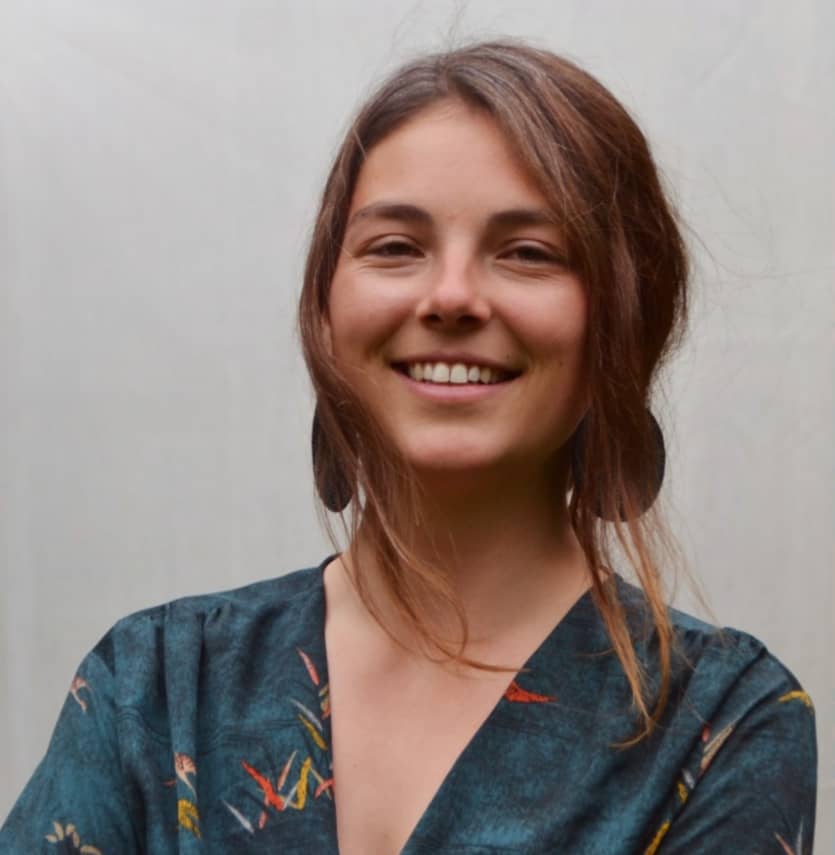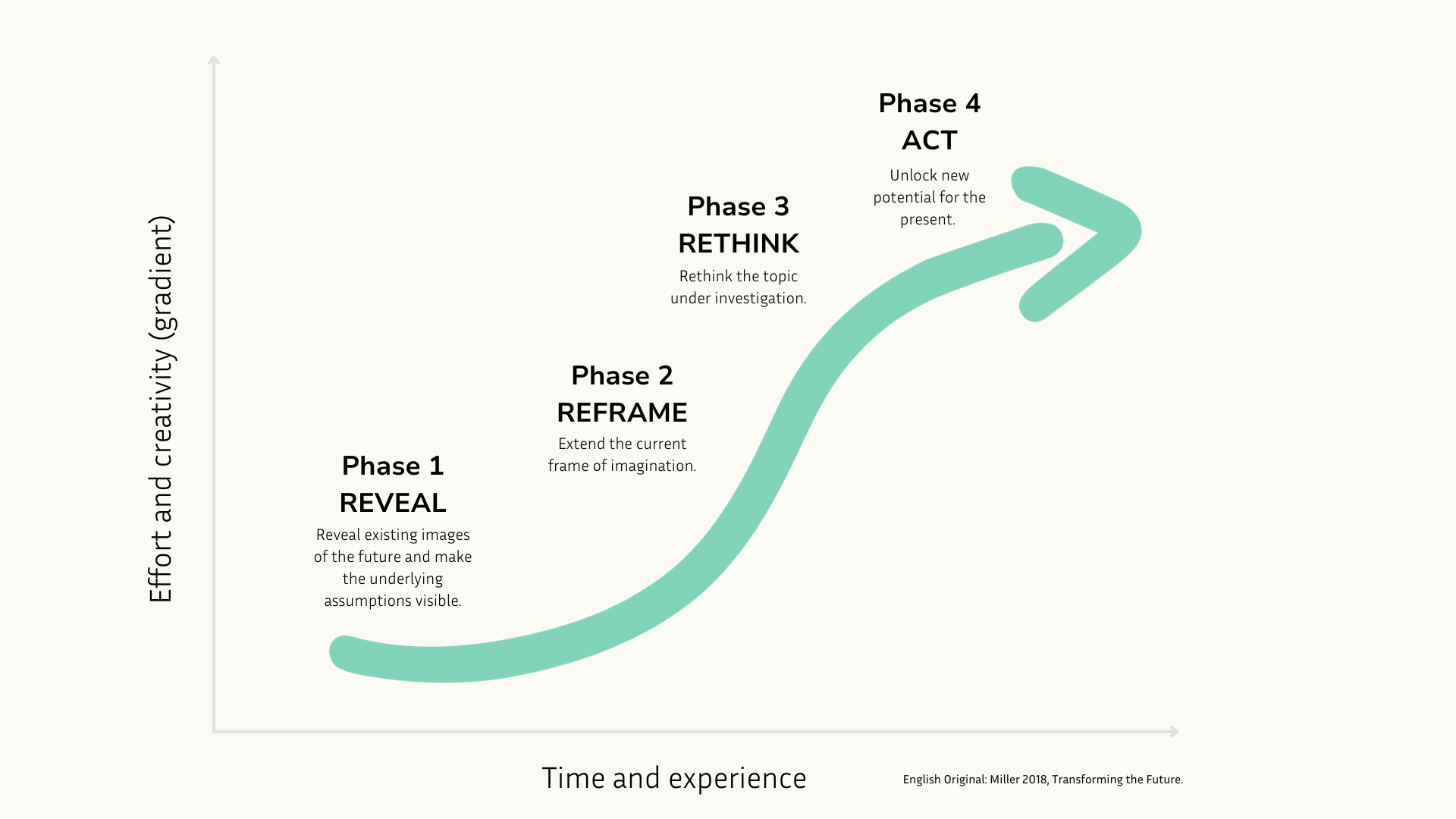FUON is a team of Futures Literacy experts. We strengthen people and organizations in dealing with the uncertain future. That way we unlock new potential and foster innovative action in the present.
In our projects, we work with Futures Literacy which is the competence to use the future with the appropriate methods for the purpose at hand. Futures Literacy is rooted in the Theory of Anticipation. It has been developed by Riel Miller and is promoted by UNESCO as a key competence for the 21st century.
Futures Literacy allows you to:
- Discover new perspectives, opportunities and innovative ideas.
- Foster the ability to act in an uncertain, complex present.
- Better deal with future challenges.
Offer
Futures Literacy Application
We design and facilitate futures workshops, events and processes with diverse methods, in order for new perspectives and options for action to emerge for you and your organisation. For example, we use the methods of Futures Literacy Laboratory, Visioning, Trend Analysis, Storytelling, or Future Search.
Contact us to discuss an approach that fits your purpose.
Futures Literacy Training
We offer trainings in the competency of Futures Literacy that strengthen you in dealing with the uncertain future. Our trainings put a special emphasis on the method of Futures Literacy Laboratory as well as on the teaching of modular futures methods that can easily be applied in practice.
Get in touch to discuss a training that fits your purpose.
Team
As a team we have decades of hands-on experience working with futures processes. We use and teach a wide variety of Futures Literacy methods that are approriate for complex social systems and that are informed by the Theory of Anticipation. Our clients span a wide spectrum of sectors such as mobility, finance, education, technology or consumer goods as well as governmental institutions.
-

Dr. Stefan Bergheim has been working in the futures field for almost 30 years. Trained as an economist, he initially created forecasts for international banks. Then he focused on participatory visioning processes about quality of life. Since 2015 he helps promote Futures Literacy by contributing to the 2018 UNESCO book “Transforming the Future” in several roles, by publishing his own book “Futures - Open to Variety” in 2021 and by facilitating multiple Futures Literacy processes and trainings.
-

Lena Tünkers holds a master’s degree in Innovation and Entrepreneurship and has gathered vast experiences in applying Futures Literacy, Experience Design and innovation methods to navigate change. Over the past years, she has worked with communities, institutions and corporates in Europe, Kenya, Australia and Mexico and guided them in their exploration and struggles with the novel and unknown. She is president of the Foresight Europe Network and mentor for start-ups of the EIT Community New European Bauhaus.
-

Martina Oettl has a decade of experience working in Collaboration Design and Facilitation for problem-solving and innovation purposes. She has organised and accompanied co-creative knowledge processes for the private industry as well as the public transport sector in Australia and the aerospace industry in France. Martina draws from a broad range of methods, reaching from Futures Literacy Laboratory, MG Taylor, Design Thinking to Theory U. Since 2020 she is teaching the method Futures Literacy Laboratory.
Methods
Futures Literacy is the competence to navigate the present.
We make our decisions based on how we imagine the future. What will the future be like? We cannot answer this question with certainty. Instead of searching for the truth, we can use the uncertainty of the future to expand the scope for making decisions and taking action. This is where the plural comes into play. There is no such thing as one certain future. Instead, we speak of futures that allow us to navigate the present in more diverse ways.
Futures Literacy is a key competence for the 21st century. It enables us to use the future for a variety of purposes by using a variety of methods, thereby unlocking new potential for action in the present. UNESCO has been promoting Futures Literacy since 2012, and a global network of Futures Literacy practitioners and researchers is applying it in a variety of contexts.
Futures Literacy is based on the theoretical foundation of Robert Rosen's Theory of Anticipation. This states that humans (and all living beings) anticipate the future. Our ideas about the future determine how we perceive and act in the present. Becoming aware of these processes and being able to influence them is a crucial part of Futures Literacy.
The most important method for strengthening Futures Literacy and using futures in a variety of ways is the Futures Literacy Laboratory. It often consists of four phases that lead participants first into probable and desirable futures (phase 1), then into alternative futures (phase 2), in order to discover and use the new potential for action (phases 3 & 4).

Sources about Futures Literacy:
- Book “Transforming the Future” by Riel Miller
- Book “Futures - Open to Variety” by Stefan Bergheim
- UNESCO Webinar on Alternative Futures with Lena Tünkers & Stefan Bergheim
Contact
Contact us at info@fuonfutures.com.
Sign-up for our newsletter
Imprint:
Martina Oettl, Marilaungasse 4, A-1030 Wien
Stefan Bergheim, Wilhelm-Busch-Str. 45, D-60431 Frankfurt am Main
Lena Tünkers, Gustav-Mahler-Str. 48, D-40885 Ratingen